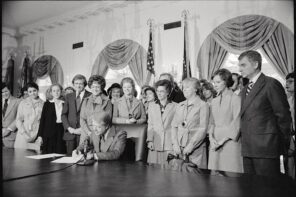When 15-year-old Alex Cooper came out to her devout Mormon family, they drove her from the family home in a Southern California suburb to an unlicensed in-home treatment program whose proprietors, fellow Mormons, promised they could help Alex change from gay to straight. Her clothes and possessions were taken and she was given a new wardrobe of thrift store castoffs. She had extremely limited contact with her parents and no contact with friends. There was no school except for homestudy. When she tried to run, she was beaten. And when she did not yield to a treatment regime centered around housework and group scripture study, she was made to wear a backpack full of rocks representing the “burden of her homosexuality” and stand facing the wall for hours on end.

Saving Alex
Alex Cooper, with Joanna Brooks
HarperCollins
March 1, 2016
As important as it is to tell the dark truth about conversion therapy, it is just a important that Alex’s story has a happy ending: she makes a courageous escape, finds allies, fights a historic court battle to go home under the protection of the law as a gay teenager, reunites with her now accepting family, finishes school, and moves to Portland to start a new life with her girlfriend. The message that LGBT kids can survive conservative religious contexts could not be more timely, especially in light of reports that new LDS Church policies deepening the exclusion of LGBT Mormons may have caused a spike in youth LGBT suicides.
In working with Alex to tell her story, I’ve come to recognize some of the most critical contributors to the survival of LGBT teens in conservative religious communities.
Know your own theology well enough to think about it critically and recognize its shortcomings
The people who held Alex in conversion therapy tried to use Mormon doctrine as an instrument of abuse. They told Alex that there was no place in God’s plan of salvation for LGBT people—that she could not go to heaven with her family. But they also held some theological views that Alex recognized as twisted and extreme. Her thorough religious education—she really had paid attention all those years in Sunday School—empowered Alex to turn a critical eye back on the people who claimed to have God on their side. “That’s not doctrine,” she told herself. And she was right. During some of her most difficult hours Alex even managed to take refuge in prayer and in Mormon scriptures that worked for her. Alex’s independent religious understanding gave her a critical edge in outthinking and outwitting the people who held her.
Spaces of acceptance with peers who can help process experiences
Alex was permitted to attend her local high school for a short portion of her stay in conversion therapy. When she did, she fell in almost instantly with the band of courageous teenagers who were leading the fight to establish a campus Gay Straight Alliance. In Utah, this was no easy fight. The state legislature had tried to ban all extracurricular clubs when GSAs first started forming in the 1990s.
By 2011, in southern Utah, Jason Osmanski took up the effort to create community for LGBT teens after his own difficult coming out process. Students at other high schools in town had been expelled or threatened, until the ACLU stepped in to help. When Alex arrived, a small but loyal group of peers were ready to stand by her. Now, at 21, Jason and Alex stand together still, and Jason will travel to be with her for the Saving Alex book release event March 7 at Powell’s bookstore in Portland.
Members of your own faith community who express unconditional acceptance—regardless of what religious leaders do or say
Alex was failed by many people, from the local Church leader who did not report her abuse when she tearfully confessed it, to citizens who turned a blind eye when she cried out for help at the local McDonald’s or tried to run away at the grocery store. But at almost every turn of her difficult journey, Alex also found outstanding grassroots Mormon people who took her in, helped her, and shared with her their own personal beliefs—beliefs that often diverged from the Church’s official position on homosexuality.
Saving Alex is full of grassroots Mormon heroes, including the local high school teacher whose own lifetime of experience as a witness to the experiences of LGBT Mormons made her a committed ally, to the youth crisis center worker who took Alex out to watch baby horses graze in the sun and told her, “Not all Mormons think that way. It’s totally fine to be gay. I think so, and I am certain God thinks so as well.”
Advocates who understand the lasting significance of home and family
Thanks to her local GSA, Alex was able to connect with a Salt Lake City lawyer named Paul Burke, and through him to a national network of LGBT civil rights advocates and experts. Many experts warned Burke that given what she’d been through, including a suicide attempt, the best thing for Alex might in fact be to get her on the next bus out of her Utah Mormon contexts and into a safer environment with a foster family. But Burke listened to the voice of his client, who was insistent that she wanted to go home to her family, but with protections that allowed her to “date girls.” Listening to Alex’s voice, he recognized that home and family remain essential to young people, even through conflicts that may seem irresolvable. In the end, by trusting her own inner voice, Alex ended up with her family and her full personhood. It is important that her advocates and allies trusted her voice as well.
Communities with a deep commitment to the sacredness of family
The fact that Alex ended up going home to her family but with a promise that they would never again try to change her, owes a great deal not only to her own deep wisdom but to teachings about the sacredness of family at the heart of the Mormon faith. Today, five years after sending her to conversion therapy, her parents have accepted Alex and they Skype with their daughter and her girlfriend a couple of times a week. There are even jokes about future grandchildren. For Mormons, after all, family is supposed to be forever, even when that family doesn’t end up fitting expectations or the mold.
This defining commitment to the continuity of family has fueled a quiet grassroots rejection of the new LDS Church-announced policies which ban the children of LGBT couples from being named as church members and blessed in religious ceremonies as infants, and prevents them from being baptized until the’re 18. The clear theological contradiction between the policy and Jesus Christ’s unequivocal and unconditional welcome to children in the New Testament has left even conservative and moderate Church members doubtful, defensive, or confused. According to some reports, a good number of rank and file Mormons are simply choosing to disregard and outlast the policy.
Saving Alex celebrates the spiritual capacity to outlast the darkest and most abusive elements of a religion. What helps? Critical thinking, persistence, acceptance in unexpected places, the capacity for self-reinvention, and love. Every day, gay Mormon teenagers do survive, and thrive, and live to tell the story. That is the critically timely story Alex Cooper tells.





